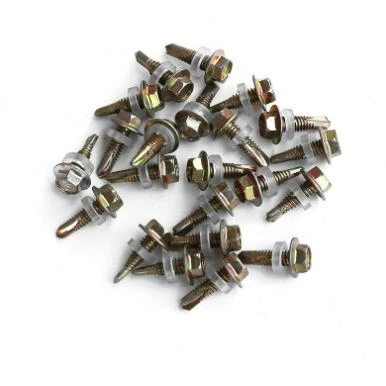

Comparison of Self-Tapping Screws and Self-Drilling Screws for Construction Projects
Okt . 14, 2024 10:53 Back to list
Comparison of Self-Tapping Screws and Self-Drilling Screws for Construction Projects
Understanding Self-Tapping and Self-Drilling Screws Key Differences and Applications
In the world of construction and DIY projects, screws play an indispensable role in ensuring strong, durable connections. Among the various types of screws available, self-tapping and self-drilling screws stand out for their unique features and applications. Understanding the distinctions between these two types of screws can help in selecting the right fastener for a given task.
What are Self-Tapping Screws?
Self-tapping screws are designed to create their own threaded hole as they are driven into a material. This type of screw has a sharp, pointed tip that allows it to penetrate a substrate without the need for a pre-drilled hole. The threads of a self-tapping screw are engineered to cut into the material, forming a tight fit as the screw is turned.
Self-tapping screws are used primarily in softer materials, such as plastics, wood, and thin sheets of metal. They are commonly employed in applications where speed and convenience are paramount, as they eliminate the need for additional tools and processes, like drilling pilot holes. However, it’s crucial to select the right type of self-tapping screw based on the thickness and density of the material. For example, using a self-tapping screw in hard metals may cause stripping or breakage if it lacks the necessary torque or holding power.
What are Self-Drilling Screws?
Self-drilling screws, often referred to as tek screws, take the concept of self-tapping screws a step further. They are equipped with a drill bit-like tip that not only allows them to create a threaded hole but also to drill through the material as they are installed. This means that self-drilling screws can be used on thicker or harder materials, such as steel and other metals, where a simple threaded screw would struggle.
self tapping screw and self drilling screw

The design of a self-drilling screw can vary, typically featuring a sharp tip that includes at least one flute, allowing it to act like a drill bit. The advantage of self-drilling screws is their efficiency; they significantly reduce installation time by negating the need for separate drilling tools or pilot holes. This makes them ideal for construction projects involving metal or composite materials, such as roofing, metal frame construction, and siding installations.
Key Differences and Applications
While self-tapping and self-drilling screws may appear similar, their differences in design and functionality dictate their appropriate uses. The primary distinction lies in their tips self-tapping screws have a pointed tip that primarily threads into softer materials, while self-drilling screws feature a drill bit tip that can penetrate through harder materials with ease.
In terms of applications, self-tapping screws are often chosen for light-duty projects, such as assembling furniture, attaching hardware to wood, or fastening thin sheets of metal. They work well where less strength is required, and where speed is essential. Conversely, self-drilling screws are preferred in heavy-duty applications, such as metal roofing installations, structural framing, and any project that involves thicker materials that would typically require pilot holes.
Conclusion
In summary, both self-tapping and self-drilling screws have distinctive advantages that cater to specific needs in construction and manufacturing. Choosing the right type of screw can enhance the efficiency and quality of any project. When planning a task, consider the material you will be working with, as well as the required strength of the connection. By understanding the differences between self-tapping and self-drilling screws, you can make informed choices that lead to successful outcomes in your projects.
Latest news
-
Hot Dip Galvanized Bolts - Hebei Longze | High Strength, Corrosion Resistance
NewsAug.01,2025
-
High-Strength Hot Dip Galvanized Bolts - LongZe | Corrosion Resistance, Custom Sizes
NewsAug.01,2025
-
Best Self Tapping Screws for Drywall - Fast & Secure Installation
NewsJul.31,2025
-
High-Strength Hot Dip Galvanized Bolts-Hebei Longze|Corrosion Resistance&Customization
NewsJul.31,2025
-
Hot Dip Galvanized Bolts-Hebei Longze Metal Products|Corrosion Resistance&High Strength
NewsJul.31,2025
-
Hot Dip Galvanized Bolts-About LongZe|High Strength, Corrosion Resistance
NewsJul.30,2025

